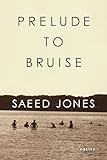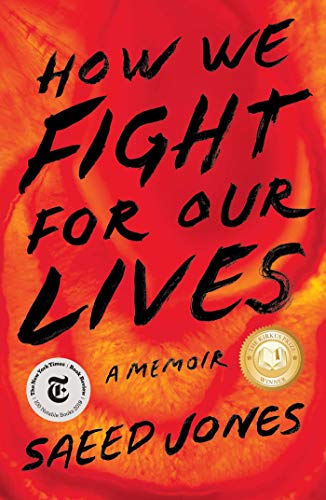Saeed Jones‘s How We Fight for Our Lives has landed on many most-anticipated book lists. The author’s second title, after the 2014 PEN Award–winning poetry collection Prelude to Bruise, explores his experiences as a black, gay teenager in Texas. We caught up with Jones to learn more about his writing process and what inspires him.
The Millions: Tell me about How We Fight for Our Lives—why you wrote it and what it means to you.
Saeed Jones: People often call it “coming of age,” which isn’t entirely inaccurate; I just tend to think of it as the story of “coming into self.” My intention was to chart the journey to the point in my life at which I felt truly self-possessed.
 I wrote it because I get very emotional when, going about my business, I encounter people, especially young people, who are in the midst of that journey. It’s hard feeling that you are not yet who you want to be—even more so if you feel that you are surrounded by people actively working to prevent that emergence.
I wrote it because I get very emotional when, going about my business, I encounter people, especially young people, who are in the midst of that journey. It’s hard feeling that you are not yet who you want to be—even more so if you feel that you are surrounded by people actively working to prevent that emergence.
I hope this book helps people coming into themselves feel less alone—and less crazed by the way America lies to young people about what they’re experiencing. I know young people aren’t the only ones who feel this way, but they were first on my mind when I set out to write it. That’s what brings me back to the blank page every day: How can I help people feel less alone? How can I explain how I stopped being a stranger to myself?
TM: You mention Greek mythology and James Baldwin as early influences. Can you talk about any other writers or works that have resonated over the years?

 SJ: I just moved into a new apartment and have been going through my books as I reorganize them. This morning, I found a signed copy of Christopher Paul Curtis’s novel The Watsons Go to Birmingham—1963. My teacher recommended it to me in the seventh or eighth grade, and I was so taken with it that she gifted me a signed copy in January 2000. I couldn’t believe an author—a real author—had spelled my name correctly. In keeping with some of the broader themes of my work, it’s both telling and quite funny that my other favorite book around that time was A Time to Kill. I loved all of Mildred D. Taylor’s books as a kid too.
SJ: I just moved into a new apartment and have been going through my books as I reorganize them. This morning, I found a signed copy of Christopher Paul Curtis’s novel The Watsons Go to Birmingham—1963. My teacher recommended it to me in the seventh or eighth grade, and I was so taken with it that she gifted me a signed copy in January 2000. I couldn’t believe an author—a real author—had spelled my name correctly. In keeping with some of the broader themes of my work, it’s both telling and quite funny that my other favorite book around that time was A Time to Kill. I loved all of Mildred D. Taylor’s books as a kid too.
Alexander Chee’s writing has been important to me for quite some time. In college, I found a very sexy, experimental short story he published in a now defunct online queer literary magazine, and it absolutely burned through me. Everything I wrote for at least a year after that was probably just mimicry of what he had accomplished with that piece.
 I was introduced to Audre Lorde—via the poem “Generation”—my junior year of high school, and her work has since been a major influence through every phase of my life as a reader and writer. The Master’s Tools Will Never Dismantle the Master’s House remains seminal. And, of course, Patricia Smith. I started reading her in middle school, started showing up at her readings in college, communicating with her in graduate school, and somehow befriended her at some point after that. I’ve had a very lucky life as a reader.
I was introduced to Audre Lorde—via the poem “Generation”—my junior year of high school, and her work has since been a major influence through every phase of my life as a reader and writer. The Master’s Tools Will Never Dismantle the Master’s House remains seminal. And, of course, Patricia Smith. I started reading her in middle school, started showing up at her readings in college, communicating with her in graduate school, and somehow befriended her at some point after that. I’ve had a very lucky life as a reader.
TM: You talk a lot about libraries in your book and their role in your development—not just intellectually but in that one memorable scene, sexually. What role did libraries play in your upbringing?
SJ: I guess, growing up as a black kid in the suburbs of North Texas, the library was one of the first public spaces I could regularly visit alone and enjoy without suspicion. It felt like I was just a person there, free to use my time and attention as I pleased. It was very freeing, even if—at the time—it didn’t strike me as so profound. Young people always take what they believe is “theirs” for granted.
TM: There’s a scene in your book where you realize your life is in danger, but the whole book is permeated by this kind of awareness of the collective possibility of danger experienced by both black and gay men. The reader really gets the sense that it isn’t just your story but the stories of everyone who’s grown up like you. Can you talk about that choice? To emphasize the collective rather than the individual?
SJ: I grew up with a creeping sense of peril. I’d feel it and try to ignore it. The news, teachers, or family members would try to impress it upon me, and I’d briefly recognize it and then try to ignore it again. In the ninth grade, a black teacher—who I do believe was well-intentioned—got very frustrated with me one day and kept me after class. “Don’t you understand,” she basically yelled, “that it’s a miracle that you’re a black boy in the ninth grade and you aren’t in a gang, in jail, or dead?” And I just remember being like, “Girl, this is Lewisville, there are no gangs here. Calm down.” And I was probably right. I didn’t want to accept the simplistic, cliché, do-or-die worldview she was trying to apply to my life. But, in many ways, America is simplistic, cliché, and do-or-die when it comes to young black people. She didn’t know I was gay; I can’t even imagine how much more dramatic that lecture would’ve been if she had. The point is, the peril is present and it doesn’t even make you special. Whether you know that or not, if you aren’t a rich straight white man, you and I have peril in common. Ain’t that a trip?
So then, in writing the memoir, I sought to honor how I felt about my circumstances at the time and how other people felt about our shared circumstances and, at least, to gesture toward the fact of our circumstances. That’s why I made a point of referencing some of the news stories that were getting a lot of attention at the time. You spend a lot of time in my head as a character and you certainly hear from people like my mother and grandmother and others, and everyone rarely agrees on what’s what. Then, occasionally, there are moments like Matthew Shepard’s and James Byrd Jr.’s murders that no one can argue with. The peril is factual and, as you note, collective.
TM: Can you talk a bit about grief and its role in your writing?
SJ: Loss was already a major theme in the poems that became Prelude to Bruise. My mother passed away suddenly when I was in the middle of writing that book. And I learned a lot about the differences between loss and grief, to say the least. It literally exploded my writing. If you look at the poems in Prelude, you can identify the later material by identifying the poems with more white space and unexpected line breaks. Grief did that to me and my writing. It exploded my expectations and introduced these blank pockets of deep feeling. My prose writing became more fluid and lyrical.
My mother was my first champion. She always encouraged me to read and write. And she seemed to be the only person who was entirely unsurprised when it started paying off in terms of pathways and opportunities. I think she always knew I would become a storyteller in some way. I had to write about her because erasing her from the story of how I came into myself as a person and a writer would’ve been ahistorical. Also, I love her. And, in its way, this book is very much about love.
This piece was produced in partnership with Publishers Weekly and the Texas Book Festival.









